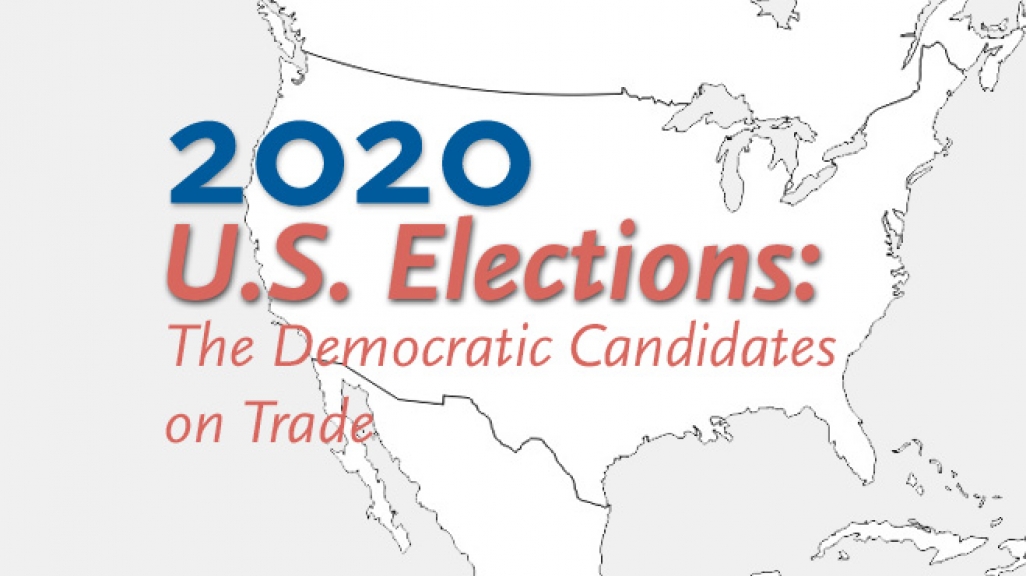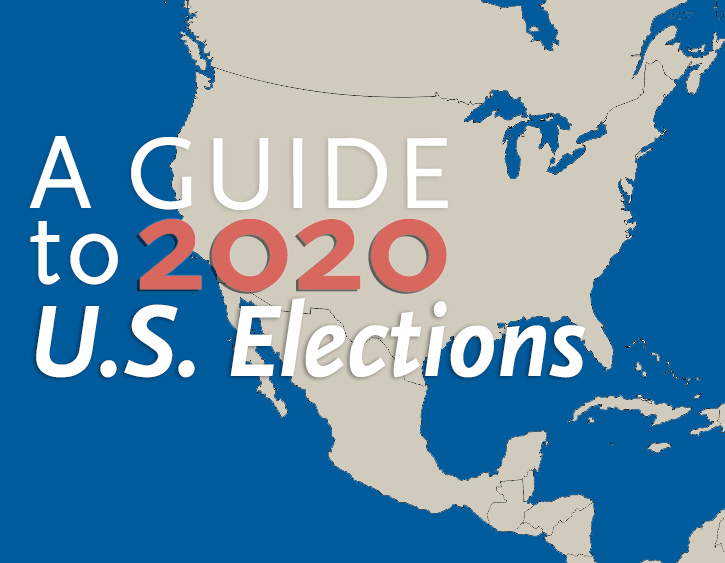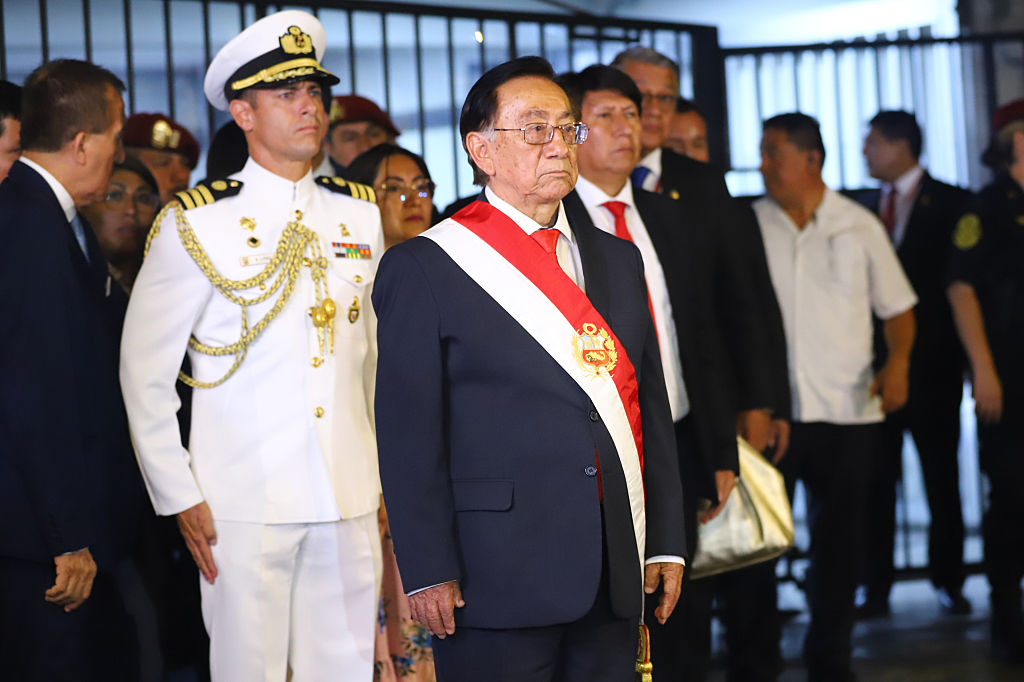U.S. 2020: The Democratic Candidates on Trade
U.S. 2020: The Democratic Candidates on Trade
From TPP to USMCA, from free trade to “fair trade,” where did the Democratic contenders stand?
When it comes to the question of trade accords, most of the Democratic presidential candidates said they supported deals that bring labor and environmental groups to the table. Most had few kind words for Donald Trump’s trade war with China. And, in an era when the U.S. president has at times used protectionist language, more than one candidate voiced support for not just free trade but “fair trade.”
But dig a little deeper and policy positions differ, including among poll leaders. Former Vice President Joe Biden backs the United States-Mexico-Canada Agreement (USMCA) slated to replace the more than a quarter-century-old North American Free Trade Agreement (NAFTA), while Vermont Senator Bernie Sanders didn’t back either deal. Elizabeth Warren criticized the USMCA in 2018 but the Massachusetts senator came around and on January 16 voted in favor of the deal, which passed the Senate 89-10. When it comes to the Trans-Pacific Partnership (TPP), which Trump withdrew the United States from shortly after he took office, each candidate held a range of positions.
Here’s a look at where they stood on U.S. trade policy, particularly as it affects Latin America.
- See their positions on other topics: climate change, immigration, security, Venezuela.
- This article was originally published on January 30, 2020.
- Lea este artículo en español.
- Biden advocates for enforcing existing trade laws while writing “the rules of the road for international trade” in a way that protects workers, the environment, and labor standards. In the first Democratic debate of 2020, Biden said his administration would not sign any trade agreements “without environmentalists at the table.”
- He’s also stated that if Washington doesn’t take charge of global trade policy, Beijing will. Biden also says he will get support from U.S. allies to challenge China on unfair trade practices.
- Some of his rivals who are trade skeptics attack Biden on his free-trade track record, which includes voting in support of NAFTA when he was a Delaware senator and backing the TPP as part of the Obama administration. When asked last year whether he was a free trader, Biden responded that he is “a fair trader.”
- Biden voiced support for the USMCA, saying that, “The vast majority of the labor movement supported it.”
These are positions of candidates who have dropped out of the race since this article was first published:
Michael Bennet
- Bennet describes trade as an “overall boon” for the U.S. economy. He says he would create a Trade Opportunity Fund in which 20 percent of benefits accrued from trade deals he signs would be set aside for targeted assistance to groups affected by those pacts. He also advocates for labor and environmental standards in trade accords and to work with trading partners and allies to “push back on China’s mercantilist trading practices.”
- The Colorado senator voted in favor of USMCA. Colorado’s top two export markets are Canada and Mexico, in that order, per the latest International Trade Administration data available.
Michael Bloomberg
- The business tycoon openly supports free trade and has a record of backing multilateral trade agreements. He also is seen as taking a softer stance than his rivals when it comes to China—not just in terms of trade, but also when it comes to matters such as human rights and democracy.
- Before he even threw his hat into the ring, the former New York City mayor criticized Trump’s May 2019 threat to slap tariffs on Mexico if it didn’t take steps to rein in immigration and called on Congress to “curb this president’s ability to conduct a potentially ruinous trade policy.”
- Bloomberg supports the USMCA.
Pete Buttigieg
- He has voiced opposition to TPP as well as to joining the agreement in its current form, the Comprehensive and Progressive Agreement for Trans-Pacific Partnership (CPTPP), saying neither addressed labor, environment, or digital economy needs that are in the U.S. interest. But he advocated for forging new trade pacts to compete with China.
- During an April 2019 CNN town hall, the then-South Bend mayor suggested that NAFTA resulted in Midwest job losses but that, for every job lost due to trade, several more have been lost as a result of automation.
- In the January 14 debate, Buttigieg said the USMCA is “not perfect” but he said that he supported the agreement, particularly in light of harmful trade wars.
John Delaney
- The former Maryland congressman takes a firmly open-market approach to trade, saying he would have the United States reenter the TPP, calling it a “powerful response to China’s economic and geopolitical misconduct.”
- He backs the USMCA and sees it as a point for reengaging on TPP.
Tulsi Gabbard
- Gabbard strongly opposes the TPP, having published several op-eds against it, as well as saying it would worsen the job losses that resulted from NAFTA. She also opposed fast-track authority on trade deals.
- Despite those criticisms of other trade deals, the Hawaii congresswoman voted in favor of the USMCA.
Amy Klobuchar
- The U.S. Senator has rejected free-trade deals in the past, voting against the Central America Free Trade Agreement (CAFTA) deal in 2006, as well as against giving Obama fast-track authority for TPP.
- However, she also said in December that she would back deals with strengthened labor and environmental measures.
- She voted in favor of USMCA’s passage in the Senate.
- She joined two other supporters in introducing bipartisan legislation called “Freedom to Export to Cuba Act” that seeks to end the Cuba trade embargo.
Deval Patrick
- As governor of Massachusetts, Patrick went on a Latin American mission to Mexico and Panama as part of his effort to boost the state’s trade partnerships.
- He has largely been a trade supporter, voicing support for TPP and USMCA.
Bernie Sanders
- While Sanders says on his website that “trade is a good thing,” he also says that the trade deals inked by Washington “were written by large multinational corporations for multinational corporations.” His campaign website says he supports “fair trade” deals that prevent outsourcing and include labor, environmental, and human rights standards.
- He has been a vocal critic and opponent of CAFTA, NAFTA, and TPP.
- The Vermont senator opposed USMCA, referring to it as “NAFTA 2.0” as a way to condemn it while slamming it for, in particular, not protecting the environment. During a February 7 Democratic debate, he said the new pact won't stop the outsourcing of U.S. jobs, adding, "There’s not one word in that trade agreement that deals with climate change. And I don’t know how in 2020 you could do that."
Tom Steyer
- Although the billionaire previously called USMCA “a win for our great partners in labor,” he subsequently said he does not support the pact due to concerns it does include sufficient environmental standards.
Elizabeth Warren
- Like Sanders, Warren contends that U.S. trade policy has been written to favor large corporations, saying, “We're going to negotiate our deals with unions at the table, with small businesses at the table, with small farmers at the table, with environmentalists at the table, with human rights activists at the table.”
- With the aforementioned issues in mind, she has outlined a series of preconditions trade partners would need to comply with in order to enter into a trade deal with the United States, with standards ranging from eliminating child labor to ending fossil fuel subsidies to ratifying anti-bribery conventions.
- She also says she would seek to increase transparency through steps such as making trade negotiations open to public comment.
- She opposed TPP.
- While the Massachusetts senator opposed earlier versions of the USMCA, she voted in support of it, recognizing what she called “improvements” in labor standards and by helping “open up some markets for farmers.”
Andrew Yang
- The tech entrepreneur says he would reenter TPP to combat Chinese influence but do so while renegotiating labor and environmental standards, as well as taking steps to protect intellectual property.
- Per The Washington Post, a Yang spokesperson said the candidate supports the USMCA.









